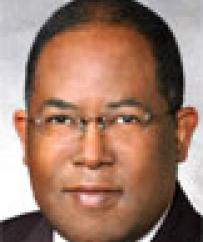While creative solutions to Southern California's traffic congestion problems, such as Metro's Orange Line busway, have proven successful in recent years, it is clear that building more freeways is not a reasonable solution to improve transit in Southern California. In the following editorial piece, exclusive to MIR, State Senator Mark Ridley-Thomas makes the case for one such creative solution, the FastLane program, which will facilitate a congestion pricing pilot program on two of the region's most congested freeways.

Mark Ridley-Thomas
Over the past several weeks I have had the opportunity to study one of the most innovative technologies in transportation: the FastLanes program. I'm convinced this "FastLane" project will deliver at least three regional benefits: 1. traffic congestion relief, 2. economic development and jobs, and 3. air quality improvement.
Los Angeles County has the opportunity to secure more than $210 million to test the concept of FastLanes as part of a national directive to help major cities better manage their freeway capacity. What more logical area than Los Angeles-the nation's single most congested city-to test this concept?
This funding is especially needed here given the region's extreme paucity of transportation resources, and would pay for much more than just operation of toll lanes. The project is, in fact, a comprehensive corridor improvement program that benefits everyone throughout the region, regardless of whether or not they choose to pay a toll.
Federally provided project funds will help pay for desperately needed new transportation infrastructure and expand and upgrade transit improvements, including new freeway express buses and rail cars, expanded vanpools, enhanced park and ride lots, increased local bus access, and traffic management and support systems.
Those who currently use the carpool lanes on these freeways need not fear. Two- and three-person carpools will continue to be able to utilize these lanes free of charge as they do now. But the FastLane program will also enable solo drivers to use the lanes where capacity exists for a fee. Other lanes of the freeway remain unchanged under the plan, giving drivers non-toll alternatives. These choices add flexibility to the current system, not detracting from it as some claim.
Value pricing where the toll dynamically varies based on congestion levels has already proven successful in reducing overall congestion in other cities across America. I'm convinced it will also work here. That is why I have authored legislation to implement the FastLane project for Los Angeles. Unlike other congestion plans before it, my bill includes key community mitigation measures, low-income commuter protections and allowances, and project accountability requirements.
SB 1422 directs Metro to identify affected communities within these project corridors and work with them to identify and mitigate project implementation impacts. It also requires that Metro assess the impacts of the "FastLane" project on low-income commuters and provide reduced toll charges and toll credits for transit users. Metro must also report back to the Legislature following the demonstration period to report on how the authority addressed these key performance measures.
I've also ensured that toll fees will be reinvested directly in the region where they were generated. All remaining project revenue generated in the corridor will stay in the corridor to pay for new transportation improvements.
These provisions will ensure the demonstration project meets the core needs and concerns of the public. Yet this is, in reality, only a pilot project. If it proves ultimately unworkable for Los Angeles, we have the right and ability to discontinue it. Yet, we will still have taken advantage of a massive infusion of federal investment to upgrade the other key elements of our transportation infrastructure that will remain a regional public asset of great benefit.
I believe that we must try new ways of combating traffic congestion and gridlock, especially with the federal government picking up the $210 million tab. To leave money on the table when a proven technology comes our way to help improve regional mobility would surely be very hard to constituents and Los Angeles County motorists who demand traffic congestion relief, economic development, and air quality improvement.
__________
Mark Ridley-Thomas represents the 26th Senate District and Chairs the California Legislative Black Caucus.
- Log in to post comments



